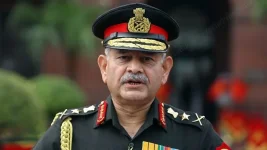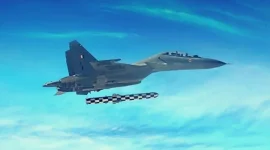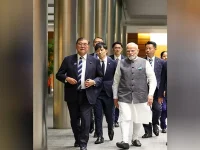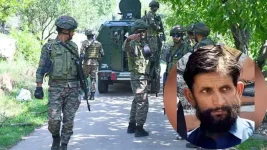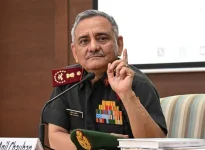A delegation from the European Union’s Political and Security Committee (PSC), the bloc’s top-level foreign and security policy body, is set to begin a landmark visit to India on Wednesday, seeking to deepen defense cooperation amid shifting Indo-Pacific security dynamics.
The delegation, led by PSC Chair Ambassador Delphine Pronk and including envoys from all 27 EU member states, will hold talks with senior officials in India’s external affairs and defense ministries, engage with strategic think tanks and visit naval facilities in Mumbai. The visit, running from Sept. 10 to 14, is the first-ever by the PSC to a non-European country.
The visit builds on recent key milestones, including the EU College of Commissioners’ visit to India in February, the inaugural EU-India Strategic Dialogue in June, and the upcoming EU-India Summit in early 2026. The EU is one of India’s largest trading partners and investors, with both sides aiming to conclude a free trade agreement by the end of 2025. The EU and India as large, pluralistic democracies share a strong commitment to upholding the rule of law, human rights, and democratic governance.
The PSC visit will coincide with a separate European Commission trade delegation led by Commissioner Maroš Šefčovič and Agriculture Commissioner Christophe Hansen, scheduled to arrive in Delhi on September 12, accompanied by senior EU trade officials. The overlapping schedule is designed to synchronize security and economic engagement, with the trade team focusing on ongoing EU-India free trade agreement negotiations, including tariffs, digital regulation, and market access, while the PSC delegation pursues maritime and defense cooperation discussions. Indian officials said the convergence of visits underscores the EU’s integrated approach to building a comprehensive strategic partnership with India.
Expressing enthusiasm for the upcoming visit, Pronk said, “EU-India collaboration is vital in key areas of mutual interest, including counterterrorism, cybersecurity, hybrid threats, maritime security and maritime domain awareness, space security, defense industry cooperation and countering foreign information manipulation and interference. These critical issues will be high on our agenda and the insights and recommendations gathered from our visit will be presented to the top political leaders."
The engagement is anchored in the 2020 EU-India Strategic Partnership Roadmap, which identifies maritime security, counter-terrorism and cyber collaboration as key areas of joint interest. Officials said discussions will likely cover expanded EU participation in naval exercises, coordinated maritime domain awareness, counter-piracy cooperation, and emerging defense technologies.
The EU has steadily increased its Indo-Pacific engagement since launching its regional strategy in 2021. France maintains a longstanding presence in the Indian Ocean, and Germany, Italy and Spain have conducted naval patrols in the region. The PSC visit marks the first attempt by the EU to present a unified defense posture in Asia.
For India, the visit dovetails with ambitious naval expansion goals. The country is pursuing a plan to increase its naval force to more than 200 warships and submarines by 2035, including new aircraft carriers and diesel electric submarines, as it seeks to diversify defense partnerships beyond Russia. Analysts say the outreach to the EU complements India’s strategic alignment with the U.S., Japan and Australia under the Quad while adding depth to its Indo-Pacific posture.
The visit is amidst China's naval rise. Western defense assessments say Beijing now operates more than 350 surface vessels and submarines, making it the world’s largest navy by hull numbers, and is adding advanced carriers, destroyers and nuclear-powered attack submarines at a pace unmatched globally. Its growing footprint in the Indian Ocean, through port projects in Gwadar, Pakistan and Hambantota, Sri Lanka, has fed Indian concerns about a “string of pearls” encircling its coastline. At the same time, China has deepened military and naval cooperation with Pakistan, supplying modern frigates, submarines and missiles, and carrying out joint patrols in the Arabian Sea. Indian officials see this axis as creating a two-front maritime challenge, forcing New Delhi to accelerate fleet expansion and seek broader partnerships. European diplomats argue that these trends underline the need for EU-India security cooperation to help keep sea lanes open and maintain regional stability.
The PSC is scheduled to visit the Indian Navy’s Western Command in Mumbai during its trip, offering a platform for briefings on maritime challenges in the Arabian Sea and Indian Ocean. Discussions are expected to pave the way for an annual institutionalized security dialogue between the EU and India, with a broader strategy to be showcased at the next EU-India summit- likely in early 2026.
Citations: EEAS (EU official site), The Economic Times, The Hindu, The Hindustan Times, ThePrint, The Tribune
Last edited:

